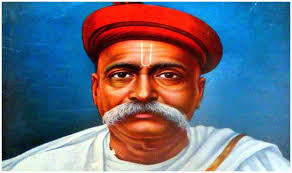Indian History
Bal Gangadhar Tilak
- 24 Jul 2020
- 4 min read
Why in News
On 23rd July, India paid tribute to the freedom fighter and educationist Bal Gangadhar Tilak on his birth anniversary.
Key Points
- Birth: He was born on 23rd July 1856 in Ratnagiri, Maharashtra.
- Freedom fighter and lawyer, Bal Gangadhar Tilak, is also known as Lokmanya Tilak.
- Educationist:
- Founder of the Deccan Education Society (1884) along with his associate Gopal Ganesh Agarkar and others.
- One of the founders of the Fergusson College (1885) in Pune through the Deccan Education Society.
- Ideology:
- He was a devout Hindu and used Hindu scriptures to rouse people to fight oppression.
- Stressed on the need for self-rule and believed that without self-rule or swarajya, no progress was possible.
- Slogan: “Swaraj is my birthright and I shall have it!”
- A book ‘Indian Unrest’ written by Valentine Chirol, an English journalist, stated Tilak the ‘father of Indian unrest’.
- Emphasised the importance of a cultural and religious revival to go with the political movements.
- Popularised the Ganesh Chaturthi festival in the Maharashtra region.
- Propounded the celebration of Shiv Jayanti on the birth anniversary of the monarch Chhatrapati Shivaji.
- Political Life: He was one of the earliest and the most vocal proponents of complete independence or swarajya (self-rule).
- Along with Lala Lajpat Rai and Bipin Chandra Pal, he was part of the Lal-Bal-Pal trio of leaders with extremist outlooks.
- Joined the Indian National Congress (INC) in 1890.
- Surat Split: It was the splitting of the INC into two groups - the Extremists and the Moderates - at the Surat session in 1907.
- Reason: The extremists wanted either Tilak or Lajpat Rai to be president, so when Rasbehari Ghose was announced as president, the extremist resorted to violence. Hence Surat Split happened.
- While extremists wanted to end the tyranny rule of British through protest, Moderates were aimed at administrative and constitutional reforms.
- The Extremist camp was led by Lal Bal and Pal and the moderate camp was led by Gopal Krishna Gokhle.
- Contribution to Freedom Movement:
- Propagated swadeshi movements and encouraged people to boycott foreign goods.
- Indian Home Rule Movement:
- It was a movement in British India on the lines of Irish Home Rule movement.
- Started in 1916, it is believed to have set the stage for the independence movement under the leadership of Annie Besant and Bal Gangadhar Tilak for the educated English speaking upper class Indians.
- All India Home Rule League: Founded by Tilak in April 1916 at Belgaum.
- It worked in Maharashtra (except Bombay), the Central Provinces, Karnataka and Berar.
- Lucknow Pact (1916): Between the INC headed by Tilak and All-India Muslim League led by Muhammad Ali Jinnah for hindu-muslim unity in nationalist struggle.
- Jail: Between 1908 and 1914, he spent 6 years in Mandalay Prison for defending the actions of revolutionaries Khudiram Bose and Prafulla Chaki.
- Khudiram Bose and Prafulla Chaki had tried to assassinate the District Judge, Mr. Kingsford by throwing bombs at the carriage in which he was supposed to travel.
- Newspapers: Weeklies Kesari (Marathi) and Mahratta (English)
- Books: Gita Rhasya and Arctic Home of the Vedas.
- Death: He died on 1st August 1920.




